Business graduates’ optimism defies pandemic pressures
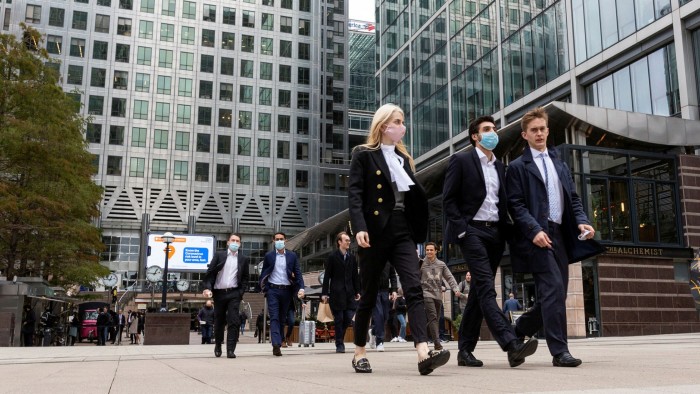
Roula Khalaf, Editor of the FT, selects her favourite stories in this weekly newsletter.
Coronavirus has severely hit human health and economic growth, but executive MBA alumni and courses emerged from the initial peak of the pandemic in robust shape, according to data from the FT’s latest survey.
Privately, many business schools were nervous this year about even canvassing the views of students and alumni for fear of distracting them at a time of frustration over disruption to timetables, teaching, travel and earning power.
Yet, a poll of more than 3,000 alumni of the leading global schools conducted by the FT in June and July found they were willing to answer questions, optimistic in their views and comfortable in their circumstances.
As might be expected from seasoned executives who took EMBAs three years ago, most reported still being in well-paid jobs. Their average annual salaries reported this summer — after many employers had already announced wage cuts — had risen to $242,000, compared with $216,000 a year earlier. Fewer than a fifth of respondents reported reductions.
Despite data from other sources suggesting that top executives have been shielded from the austerity facing many junior colleagues, the survey showed that the burden of salary cuts fell more heavily on EMBA alumni with the most senior jobs. Salaries were down for 19 per cent of those in board positions, 16 per cent who were partners and 14 per cent in director-level positions.
The greatest disruption was for those working in transport, logistics, retail, media, marketing and industrial companies, with a minority in these sectors reporting a short-term reduction in salary, furlough or a change in job. Those in areas such as the military and the public and non-profit sectors were unsurprisingly far less affected. Intriguingly, however, few in finance and banking reported any squeeze in their financial situation.
Executive MBA graduates were also fairly optimistic about the future: 26 per cent said they anticipated recruiting fewer staff over the coming 12 months, while 43 per cent said they would recruit more. More than two-thirds of respondents said they expected a full or partial recovery of their companies’ operations by the end of the year, with just 13 per cent predicting a partial or significant further reduction.
This year, with job prospects so uncertain, many new bachelors graduates applied for masters courses, including programmes in management and finance. A significant number, including those with some early professional and business experience — but possibly also those more vulnerable to job cuts — decided to apply to MBA programmes.
For EMBA courses, however, as for executive education, there has been much nervousness at business schools since the early part of the year about a possible reduction in demand as companies seek to save costs and employees prefer to focus on their jobs, rather than partially step back to retrain when their employment prospects are uncertain.
Yet, the FT survey this summer of business school administrators suggested that such fears were misplaced, or at least premature. Applications by prospective EMBA students by mid-2020 were almost unchanged from 2019. There were even slightly more at Asian schools, perhaps reflecting the region’s earlier recovery from the pandemic.
The number of applicants offered places was also little affected: there were marginally more students on average starting EMBA courses at Asian and Latin American business schools in the second half of this year, and only fractionally fewer in the UK, Europe and North America.
The extent of internal disruption was clear, with business schools making radical shifts to online teaching in response to travel restrictions and lockdowns. Asian schools on average had taught less than five hours of their courses online before Covid-19 and nearly 146 since; in the UK, the figure rose from 53 to 93 hours. All predicted much more online and blended teaching in the months ahead.
Nearly half of schools said they had offered students the chance to defer their studies because of coronavirus, while more than a third offered mental health support and 30 per cent some form of funding assistance, including discounts, grants or financial advice.
More than half of schools also reported they took their broader social role in the community around their institutions seriously, offering scholarships, online courses — some free of charge to the public — as well as support for staff, on-campus testing and partnerships with government.
Alumni also sent some important signals to their schools. Many EMBA graduates said that while business schools were doing a good job in providing management, leadership and strategy training, they should do more with technology and online teaching. More broadly, they said that in the post-coronavirus era, they increasingly sought recruits displaying resilience and digital skills.
An optimistic final note was that most alumni remained very positive about the value of business education. Asked to rate on a 10-point scale the extent to which they would recommend studying for an EMBA to colleagues, 63 per cent said nine or 10. The qualification may need to evolve in its content and the way it is taught, but alumni still value it highly for the next generation.
EMBA Covid charts
By Leo Cremonezi and Sam Stephens
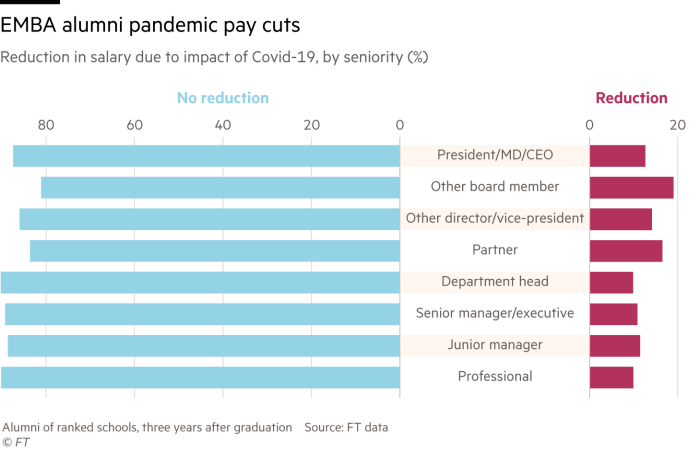
Senior staff among EMBA alumni surveyed are more likely to have taken a pay cut during the coronavirus pandemic
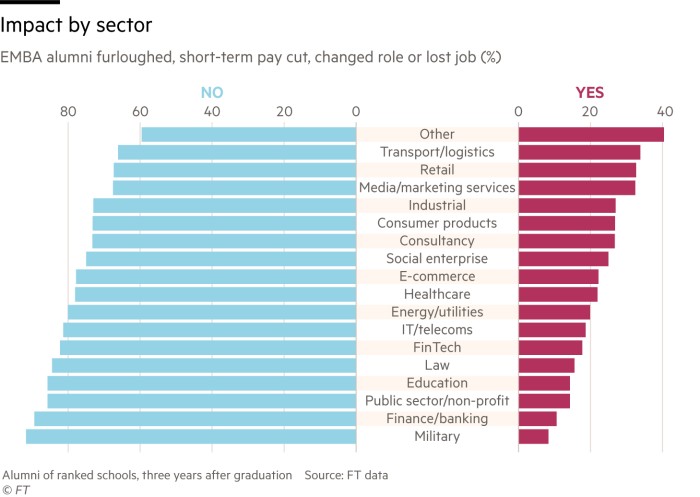
Logistics, retail and media and marketing services are the sectors most affected by furlough, short-term pay cuts and job changes
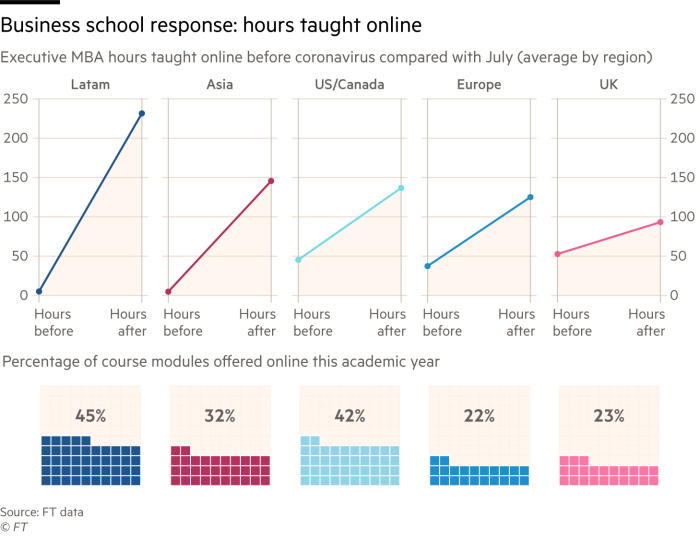
Latin America and Asia saw the steepest increase in hours taught online since the start of the pandemic, from a low base
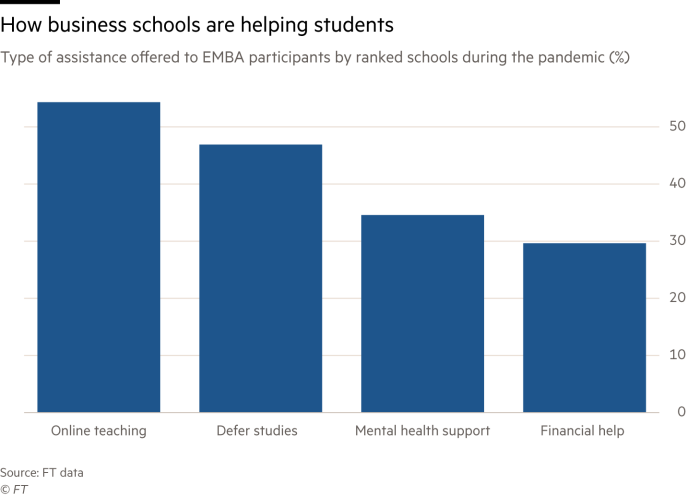
More online teaching and the chance to defer studies have been the most common business school responses to the pandemic
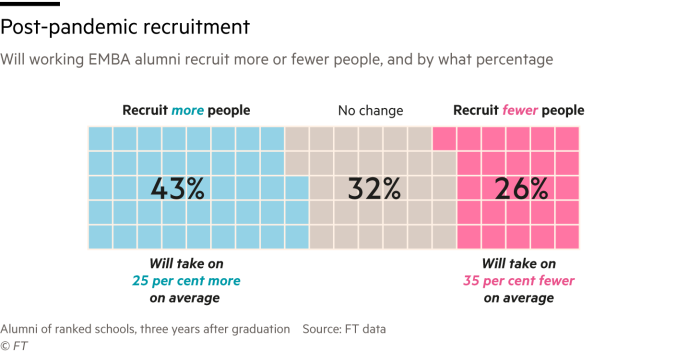
More than 40 per cent of alumni were likely to recruit more people in the 12 months from July
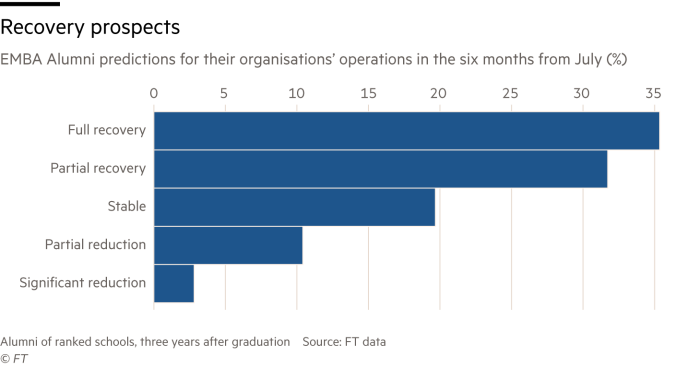
Alumni were positive about their organisations’ prospects in the six months from July
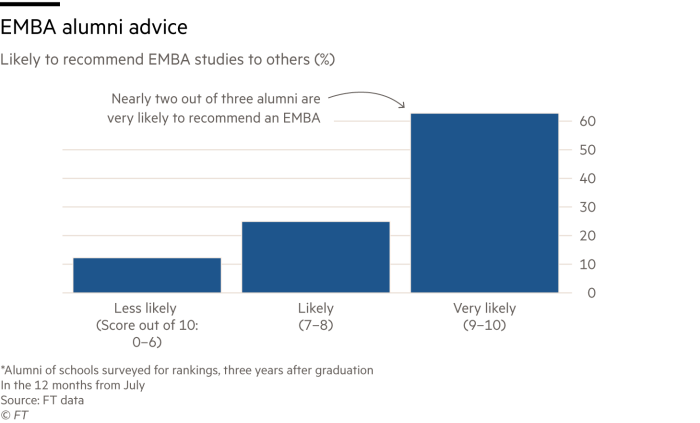
Well over 80 per cent of alumni are likely or very likely to recommend an EMBA
Comments